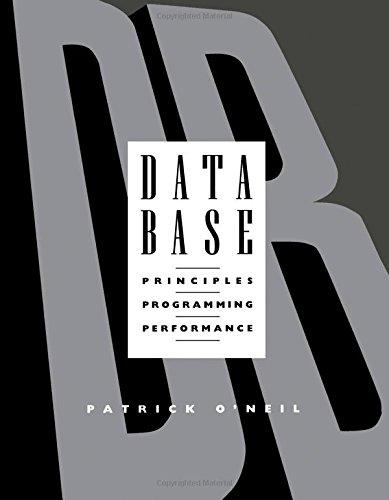Question
Study the Sample Application Using Object-Relational Features of Oracle from Oracles Database Object-Relational Developers Guide. The guide gives the sql to create a Purchase Order
Study the Sample Application Using Object-Relational Features of Oracle from Oracles Database Object-Relational Developers Guide. The guide gives the sql to create a Purchase Order (PO) application. You will write (or copy and paste) the SQL from the guide to Oracle Developer to create the database. First, you will create PO application that has only relational objects, then you will create an object-relational version of the database PO.
As you complete each task below, answer the questions that follow. Write all answers to the questions on this document.
In items 1 3, you will write and execute the sql examples in from Oracles Database-Object Relational Developers Guide.
1. Write the SQL to create Example A-1 Creating the Customer_reltab Table, Example A-2 Creating the PurchaseOrder_reltab Table, Example A-3 Creating the Stock_reltab and Table Example A-4 Creating the LineItems_reltab Table.
a. For each example, add at least one comment to the CREATE TABLE statement that describes the purpose and the components of the CREATE statement.
2. Write the SQL for Example A-5 Establish Inventory, Example A-6 Register Customers, Example A-7 Place Orders and Example A-8 Detail Line Items.
a. For each example, add at least one comment that describes the purpose and the components of the INSERT statements.
3. Write the SQL for Examples A-9 A-13.
a. For each example, add at least one comment that describes the purpose and the components of the INSERT statements
4. Execute the SQL of the relational PO Application
Object-Relational Model PO Application
5. Write the SQL for Examples A-14 A-39.
a. For each example, add at least one comment that describes the purpose and the components of the statement.
6. Describe the differences between the relational PO datable and the object-relational PO database.
7. A semantic data model is a method of structuring data in order to represent it in a specific logical way. The enhanced E-R Model (EER) also known as the Extended Entity Relationship Model allows for semantic constructs such as a specialization hierarchy. Study the following specialization hierarchy.

8. Identify the Super type/Subtype relationships.
a. List the super type/subtype pairs.
b. For each supertype/subtype pair identify the inherited attributes.
c. For each supertype/subtype pair, identify the disjoint or overlapping constrint.
d. For each supertype/subtype pair, identify the Completeness or Partial completeness constraint
Here is the url to use for the question.its the sample application described in the question's first statement. above https://docs.oracle.com/database/121/ADOBJ/adobjxmp.htm#ADOBJ7505
PERSON PH P LNAM OFFICE P IS EM P IS STU PK OPFICE NUM OFFICE PHON EMPLOYE STUDENT MP HIRE DATE MP IS PROP SU TYPE FK2OFFICE NUM DMNSTRATOR PROFESSOR GRADUATE UNDERGRAD ADM TITLE PROF RANK ORAD THESIS PERSON PH P LNAM OFFICE P IS EM P IS STU PK OPFICE NUM OFFICE PHON EMPLOYE STUDENT MP HIRE DATE MP IS PROP SU TYPE FK2OFFICE NUM DMNSTRATOR PROFESSOR GRADUATE UNDERGRAD ADM TITLE PROF RANK ORAD THESISStep by Step Solution
There are 3 Steps involved in it
Step: 1

Get Instant Access to Expert-Tailored Solutions
See step-by-step solutions with expert insights and AI powered tools for academic success
Step: 2

Step: 3

Ace Your Homework with AI
Get the answers you need in no time with our AI-driven, step-by-step assistance
Get Started


